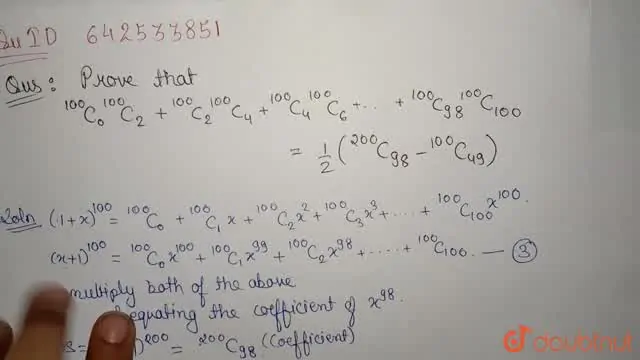Prove that ^100C1000C2+100C1002C4+100C1004C6++100C10098C100=12[^(200)C98−100C49].
Step by step video & image solution for Prove that ^100 C_0^(100)C_2+^(100)C_2^(100)C_4+^(100)C_4^(100)C_6++^(100)C_(98)^(100)C_(100)=1/2[^(200)C_(98)-^(100)C_(49)]dot by Maths experts to help you in doubts & scoring excellent marks in Class 11 exams.
Related Playlists
Similar Questions
Prove the following identieties using the theory of permutation where C0,C1,C2,……Cn are the combinatorial coefficents in the expansion of (1+x)n,n∈N:
100C10+5.100C11+10.100C12+10.100C13+10.100C14+10.100C15=105C90View SolutionThe value of 40C0×100C40_40C1×99C40+40C2×98C40−…….+40C40×60C40 is equal to ____.
View SolutionEvaluate: ^100C97
View SolutionLet t100=100∑r=01(100Cr)5 and S100=100∑r=0r(100Cr)5, then the value of 100t100S100 is (a) 1 (b) 2 (c) 3 (d) 4
View SolutionIf 100C6+4. 100C7+6. 100C8+4. 100C9+100C10 has the value equal to xCy , then the possible value (s) of x+y can be :
View SolutionIf ^100C5+5100C6+10100C7+10100C8+5100C9+100C10 has the value equal to ^nCr , then least value of (n+r) is equal to 200 (2) 195 (3) 115 (4) 105
View SolutionThe coefficient of x53 in the expansion 100∑m=0^100Cm(x−3)100−m2m is (a) 100C47 (b.) 100C53 (c.) −100C53 (d.) none of these
View SolutionThe value of 50∑r=0(.100Cr.200C150+r) is equal to
View SolutionC01+C12+C23+....+C100101 equals
View SolutionThe value of (1000)(200150)+(1001)(200151)+......+(10050)(200200) equals (where (nr)=nCr)
View Solution


